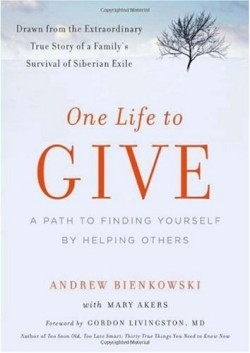It looks like you've stumbled upon a page meant to be read by our code instead of viewed directly. You're probably looking for this page.
One Life to Give
A Path to Finding Yourself by Helping Others
Sometimes it is hard to appreciate the deluge of books being published about personal growth or helping oneself by helping others. At their worst, these books seem glib and superficial, nothing more than a set of pat phrases stuck together with a little narrative and a book binding. Therefore, when a book with authentic substance arrives, it gets our attention.
Andrew Bienkowski’s One Life to Give is just such a book. Part self-help, part memoir, this little volume is an account of Bienkowksi’s experience as the now sole survivor of his Polish family’s forced Siberian exile in the 1940s and the meaning he has made of it. Or, viewed another way, this is Bienkowski’s insight into what makes life joyful and worthwhile, backed up by stories from his own harsh experience.
The storytelling is the invitation to each idea. As in Pearl Buck’s memoir My Several Worlds, Bienkowski combines childhood memory and adult experience around a particular theme in each chapter. Like Viktor Frankl’s 1946 classic Man’s Search for Meaning, this book has a keen eye for spotting the best of human spirit and endeavor in the most trying of circumstances.
And his circumstances were indeed trying. Bienkowski was only five years old when his family-maternal grandparents, mother, and little brother-was forcibly deported from the city of Lvov by Stalin in the fall of 1939. (His father, an officer in the Polish army, was being held as a prisoner of war.) They were loaded onto a cattle car with other deportees; journeyed for three weeks without food, heat, or information about their fate; and were dumped on the Siberian Plain. They found a mud hut in a nearby village in which to live, and struggled to survive in a harsh environment without much help from the villagers, who were forbidden to assist them.
The author’s grandfather, Vladislav Paluchowski, makes a stunning sacrifice in order to help his family survive; he starves, so that his grandchildren might eat. This sacrifice and Bienkowski’s enduring gratitude compose the exquisite center of the story and perhaps of Bienkowski’s adult life. His grandfather gave his life for others, and similarly, Bienkowski became a practicing psychologist who assisted others in finding life and light. His stories of his family members’ resourcefulness, courage, and faith illuminate the human potential to not only overcome obstacles, but to affect and transform others by one’s efforts to act with integrity, generosity, and purpose. His application of the principles he learned as a young boy to his professional practice assist the reader in making the jump from historical story to modern dilemma.
Not only is the content compelling, but Bienkowski had the good sense to work with author Mary Akers, who has shaped the book into a graceful and absorbing read. This is the third book written by this team; Radical Gratitude and Other Life Lessons Learned in Siberia and The Greatest Gift: Lessons Learned in Exile in Siberia cover similar territory. Spend the first part of the winter with this little book, and you will most likely feel renewed joy and gratitude for the people around you and perhaps even for the snow falling on your roof. (January) Teresa Scollon
Disclosure: This article is not an endorsement, but a review. The publisher of this book provided free copies of the book to have their book reviewed by a professional reviewer. No fee was paid by the publisher for this review. Foreword Reviews only recommends books that we love. Foreword Magazine, Inc. is disclosing this in accordance with the Federal Trade Commission’s 16 CFR, Part 255.
